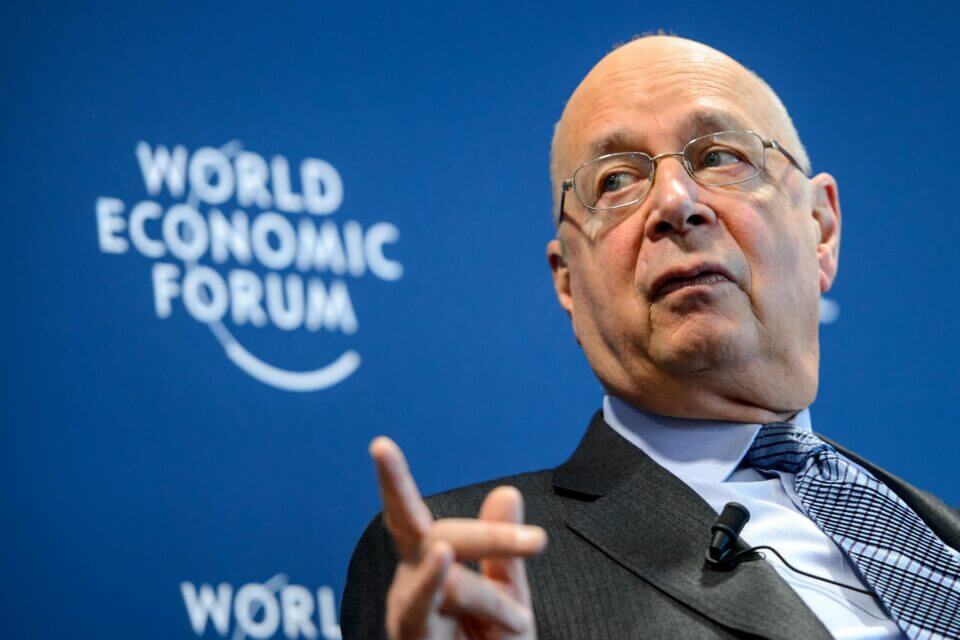
“Echoing this notion from on high, in 2016 the [World Economic Forum] announced the imminence of a post-historical future in the Marxist sense: ‘Welcome to 2030. I own nothing, have no privacy, and life has never been better.'”
The book that came out in 2020 titled COVID-19: The Great Reset—by Klaus Schwab and Thierry Malleret of World Economic Forum (WEF) fame—is a fascinating, perhaps even world-historical, document. To be sure, the book does not, in itself, make for a particularly engrossing read. Rather, what is fascinating about it is the self-evidence and utter matter-of-factness with which it lays out the spirit of our times. The Great Reset offers what could be described as an engineer’s perspective on the global trajectory. Confronted with the inefficiency of the world’s response to the breakout of the Coronavirus (COVID-19) pandemic, the book asks a simple question: How do we fix this broken thing called neoliberalism?
The answers it provides are neither compelling nor sufficiently detailed to be truly actionable, but the overall purport is unmistakable. Schwab and Malleret call on everyone to work together toward a more globalized, more centralized, more digitized planetary state to put us on a path “to a better world: more inclusive, more equitable and more respectful of Mother Nature.” The alternative: “a world that resembles the one we just left behind—but worse and constantly dogged by nasty surprises.”
The way the choice is framed should immediately remind us of a retrograde Marxism. To be clear, I am not referring to Marxism here to invoke a “Red Scare.” Before it became a moniker for everything supposedly un-American, Marxism was an authentic philosophy. Schwab’s framing of the alternatives has Marxist overtones not because it is un-American but, rather, because it frames the choice in terms of a “reset” or revolution as opposed to a continuation or evolution. As such, Schwab has done his best to keep in vogue a supremely German sentiment: Wo aber Gefahr ist, wächst/Das Rettende auch. (“Where, however, is danger, there also lies in wait the saving power.”) Or in Schwab’s own words: “The looming challenges could be more consequential than we have until now chosen to imagine, but our capacity to reset could also be greater than we had previously dared to hope.”
Marxism as a whole relies on the idea that in order to ascend, as in Dante’s Divine Comedy, we must first go all the way down—that before there can be a Resurrection, we must pass through the Harrowing of Hell. A passage near the end of Friedrich Engels’ 1880 popularizing essay Socialism: Utopian and Scientific should suffice to confirm this: “Whilst the capitalist mode of production more and more completely transforms the great majority of the population into proletarians, it creates the power which, under penalty of its own destruction, is forced to accomplish [the] revolution.” The end result of this destruction is a well-known staple of Marxist orthodoxy: “The proletariat seizes political power and turns the means of production into State property.”
Echoing this notion from on high, in 2016 the WEF announced the imminence of a post-historical future in the Marxist sense: “Welcome to 2030. I own nothing, have no privacy, and life has never been better.” While we could go off on a tangent and remark on the highly specious character of a globalist and eminently bourgeois initiative like that of the WEF declaring an end to the proletarian revolution, or the fact that communistic slogans seem to have been appropriated by the world’s most influential economic class, it would be more fruitful to ask why something like this could have happened in the first place. The fact of the matter is that capitalism and communism, though avowed archnemeses, agree profoundly on a common end. While most run-of-the-mill capitalists might not concede that owning nothing and having no privacy will get us there, they can hardly disagree with the WEF’s overall, purported aim: to secure human happiness.
Evolutionary Socialism and Revolutionary Socialism
The fact of this profound agreement can easily be recognized if we pay sufficient attention. In his flagship work Capital, Marx makes clear that the aim of a properly functioning political economy should be to “decently and humanely satisfy the wants of the great mass.” Similarly, in Adam Smith’s The Wealth of Nations, immediately in the introduction, we come upon the plan of the work to investigate “how…the nation is supplied with all the necessities and conveniences for which it has occasion,” or otherwise, to take stock of the effects of particular economic layouts on “society’s general welfare.” Both outlooks prioritize economy, that exclusively utilitarian business of satisfying needs and wants, over and above any other aspect of human flourishing, which is often disregarded as a mere impediment to hedonic efficiency.
In fact, if we take a closer look at Marx’ and Engels’ supposed quarrel with the capitalistic mode of production, we discover that its deleterious effects on human sociality—so-called commodity fetishism—are deemed only subsidiary to its insufficiency from a utilitarian standpoint. The real problem with capitalism is that it is insufficiently economic. Capitalism reigns as the last instance of a false consciousness that makes men believe in ideological phantasms. Like religion, capitalism promises to bestow general welfare, even as, in reality, it prolongs our sojourn through the Vale of Tears. Under the sway of capitalism, a general immiseration is once again uplifted to the sovereign position of natural law. Economic relations, which according to Marx should be brought under definite, human control, remain obscured by the veil of mystification so long as they are presented as the workings of an “Invisible Hand.” This mystification thus ensures the continued impoverishment of human life, which is once again enthralled to the “halo of religion”—a cult of Mammon, this time around—to the detriment of our real economic conditions.
The ongoing immiseration of humans under capitalism does not only affect the penurious masses—the proletariat class—but, more strikingly, the capitalists themselves, who are the last humans to suffer through a schismatic condition. In Capital, Marx characterizes this condition as “a Faustian conflict between the passion for accumulation and the desire for enjoyment.” This conflict goes right to the heart of the contradictory nature of capitalism as conceived of within the Marxist framework. Smith as well had spoken of this conflict, but he had done so in a way that would have clearly evidenced his false consciousness: “It is vanity, not the ease or the pleasure, which interest us. The rich man glories in his riches because he feels that they naturally draw upon him the attention of the world.” The capitalist’s passion for accumulation is, thus, an expression of vanity, the final relic of an ancient world that is speedily fading.
For Marx, then, capitalism is a defective socialism—marred by traces of old-world vanity—which carries within itself the seeds of its own self-overcoming. The capitalist mode of production is of a “transitory necessity,” with the capitalist himself being “capital personified,” a nebulous, almost tragic figure, doomed to the ascetic project of “ruthlessly [forcing] the human race to produce for production’s sake.” It is precisely on the fine point of capitalism’s transitory nature that capitalists and Marxists part ways. Capitalists recognize (neo-)liberal capitalism as an already realized final stage of socio-economic development. A gradual, chronological continuation of the techno-capitalist paradigm will, as it has been doing since the early days of the Industrial Revolution, come in like a “rising tide [which] lifts all boats.” Marxists, on the other hand, look at capitalism as a descent into darkness, a katabasis, from which we will return only if sufficiently lucky—that is, if we manage to pick out the opportune moment for revolution, the kairos, in the relentless flow of progressive time.
Capitalism presents us with an evolutionary socialism, while Marxism outlines a revolutionary socialism. In both cases, the end goal is a well-oiled, utilitarian machine, a system that satisfies the needs and wants of everyone, everywhere and at all times. To be perfectly exact, capitalism and Marxism both aim toward the total economization of the world, to bring about a state which Simone Weil once characterized as eternal beatitude, “a state where to look is to eat,” or which, in more prosaic terms, could be called Fully Automated Luxury Communism. Aldous Huxley’s 1932 book Brave New World, while approximate, still falls short of this blessed vision. Octave Mirbeau’s 1899 work The Torture Garden comes much closer.
The deep fraternity between capitalism and Marxism has, of course, been recognized before. Back in the 1970s, the German-Belgian philosopher Rudolf Boehm identified both as contending outlooks on an overarching process of historical Progress, which he considered to be doomed not only accidentally, by historical circumstance or technical defect, but fundamentally. According to Boehm, the problem that we—socialists all—inevitably face is actually rather dire: By choosing an impossible destination, we have set ourselves on a damned course. More concretely, it is quite possible that Marx and Engels were correct about the negative evolution of capitalism while simultaneously being wrong about the possibility of a proletarian revolution. If this turns out to be the case, it also becomes quite possible for the negative effects of capitalism—particularly, its pervasive ugliness, its exhaustion of natural resources, and the ever-increasing socio-economic stratification elicited by it—to compound ad infinitum.
Just like Georg Wilhelm Friedrich Hegel’s The Phenomenology of Spirit, to which Marx and Engels were deeply indebted on a methodological level, works like Capital and The Communist Manifesto should be read as a kind of theodicy—as a vindication of historical providence despite very contrary evidence. Marx was always trying to divine the architectonic plan, the meaning, behind capitalism’s historical emergence. (As if everything in history should offer us a glimpse of the divine Intention. As if just about anything can be attributed some meaningful finality.) But what if capitalism’s only meaning is something we have invested into it? What if, to paraphrase Boehm, our socialistic belief in the meaning of capitalism is just an error, whose only truth is its unfortunate reality?
Upon Earth There Is Not His Like, Who is Made Without Fear
Boehm argued that Occidental history is characterized—above all—by an inability to distinguish between two kinds of grounds or foundational relations, as well as that this failure can be attributed, in the first place, to our hubristic hankering to acquire the status of divinity. In particular, Occidental thinking has traditionally sought to conflate necessary conditions and sufficient causes, by insisting on some fashion in which the prior automatically supply the latter. But this conflation only works in the minds of philosophers; it does not and cannot hold as a matter of course.
To illustrate this, consider the very simple case of someone trying to buy something. In order for that person to be able to pay for the item he wishes to procure, it is necessary that he has the correct amount of money. But having the right amount of money is, in itself, not sufficient to actually complete the purchase. For that, the person must also be willing to spend his money. Translating this to philosophical jargon, we could say that having the appropriate funds grounds buying something. But the verb “to ground” is ambiguous here. It does not sufficiently specify what we are trying to say, namely, that having money conditions buying something but in no way causes it. Or to go back to Weil’s notion of beatitude: that looking is necessary but in no way sufficient for eating.
In fact, remaining on the topic of consumption, we should emphasize that looking, i.e., focusing one’s attention or intending, is indeed only the very least of what is involved in acquiring sustenance. A whole social world opens up in the interstice. Indeed, in order to ensure our own survival, it is usually necessary that we engage in social cooperation with other humans. To engage with other people in this manner, we inevitably enter into two kinds of reciprocal (but fundamentally asymmetrical) dependency relationships. On the one hand, whoever relies on others for the procurement of goods and services to satisfy his own needs and wants, makes himself dependent on those he relies on. He may be exercising a kind of “lordship” over them—he is the sufficient cause of their servile behavior—but, in doing so, he must also inevitably dispense with his own autarky, his self-reliance. On the other hand, whoever submits to the call of others makes himself dependable to those now relying on him. He may have forsaken his own autonomy, his self-possession, but, in doing so, he has made his existence a necessary condition for their subsistence.
Crucially, these twin relationships trade off against one another. It is indeed quite impossible to strengthen one without slackening the other, while still relating in some fashion to other people. To be independent of other people, then, requires a breaking away from the whole sphere of social relations. This is an impulse as old as time. It is an intrinsically human desire, whose fulfilment, paradoxically, can only be realized in something inhuman. As Aristotle once put it: “a man who is incapable of entering into community, or who is so self-sufficing that he has no need to do so, is no part of a city, so that he must be either a lower animal or a god.”
While the motive may be ancient, as a deliberate political project, human independence is only a couple of centuries old. Only with the advent of modern liberalism did freedom in this sense become foundational to political organization. The liberal sense of freedom is an individualistic one. It was specifically defined by John Locke—often dubbed “the father of classical liberalism”—as mutual independence. But, per Aristotle, this is a state only accessible by gods: a state in which autarky and autonomy are vested in the same person—what in theology is called aseity.
According to Marx and Engels, capitalism itself precludes this deific state. After all, its mode of production is fundamentally tied to the mediation of wage-labor, which enforces stringent dependency relations between producers and consumers. Just as, in more ancient times, slavery or serfdom mediated the social landscape, so, in the modern, capitalistic era, wage-labor stands between looking and eating. Marx and Engels believed wage labor could be abolished within the human realm, by means of a direct appropriation of the means of production. But just this cannot be effected so long as human relations are in play. To bring about the communistic paradise, we must rely on a third party, the State, which will therefore not be allowed to “wither away” but, in fact, will only enlarge and keep spreading out the longer we remain committed to our fantastic ideals of deific individuality.
Perhaps now we can try to understand how an organization like the WEF came to champion Marxist ideas. Engels saw the last phase of capitalism as one in which the power of the State “comes to a head”: “The modern state, no matter what its form, is essentially a capitalist machine—the state of the capitalists, the ideal personification of the total national capital. The more it proceeds to the taking over of productive forces, the more does it actually become the national capitalist, the more citizens does it exploit.” Schwab as well hints at the renewed preponderance of “government” over individual “companies” in a chapter on “The return of ‘big’ government.” He is even somewhat vindictive about it (“look at those once-mighty companies begging for help”).
What this looks like is the WEF deliberately seeking to bring about the final stage in the necessary development of capitalism: the consolidation of the State as the “national capitalist.” But what if, contrary to Engels, “the capitalist relation” does not then eventually “topple over”? What if this final stage, though necessary, is not sufficient grounds for a communistic reversal? What if it simply is not the case that an increasingly powerful and more possessive State apparatus actually conceals within itself “the technical conditions that form the elements” of its dissolution? What then? We would perhaps be forced to contend with the fact that—barring profound ecological shifts—State capitalism stands to become our whole horizon.
Ever since Hegel, it has become possible to say: “The March of God in the world, that is what the State is.” Marx and Engels as well see in the State a kind of deus ex machina, which will operate behind the scenes as a nebulous facilitator. Having outlived its role, it will then suddenly disappear—and all is well that ends well. But what if, actually, it was the philosopher Thomas Hobbes who painted the more accurate picture? What if the State is not an “actual God” but really a Leviathan? What if, instead of having repossessed the stature of divinity, we have simply prostrated ourselves before one who, as it says in Job, “is made without fear”? What if our liberty, our Edenic independence from others, is only an illusory sovereignty, which comes at the cost of both our self-reliance and our self-possession before Leviathan, who is “king over all the children of pride”? What if, finally, instead of achieving godhood we stand to become indistinguishable from the “lower animals”? Will we then, like Job, still be able to look inwards and say: “I abhor myself, and repent in dust and ashes”? Or will we shrink away even from self-loathing?.
Michael Weyns is a Ph.D. candidate at Ghent University.











